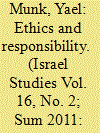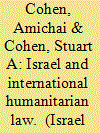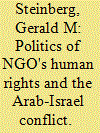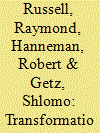|
|
|
Sort Order |
|
|
|
Items / Page
|
|
|
|
|
|
|
| Srl | Item |
| 1 |
ID:
105434


|
|
|
|
|
| Publication |
2011.
|
| Summary/Abstract |
The article analyzes the place of kibbutz children's literature in the internal kibbutz discourse during the fervent 1940s and 1950s. During this era, all kibbutz movements implemented the principle of communal sleeping of children and youths, before the gradual erosion and decline of this fundamental principle of Communal Upbringing began. Kibbutz children's literature of this period has often been regarded as a tool for reinforcing collective kibbutz values, as taught by the various institutions of communal upbringing. The article investigates a parallel role that kibbutz children's literature has played, with subversive undercurrents. I demonstrate that alongside the expected glorification of communal ideology, some texts also evoked deliberations and frustrations-at times even piercing criticism-regarding the principles of communal upbringing, especially the marginalization of the family institution. It presents and analyzes several key children's books published in the 1940s and 1950s by the two kibbutz publishing houses: Kibbutz Meuhad and Sifriyat Poalim, all of which have been published in several editions.
|
|
|
|
|
|
|
|
|
|
|
|
|
|
|
|
| 2 |
ID:
105435


|
|
|
|
|
| Publication |
2011.
|
| Summary/Abstract |
The article characterizes the nature of several recent Israeli documentary productions. Following Levinas's concept of responsibility toward the Other, it reviews the various forms of alterity that seem to dominate today's Israeli documentaries. Beginning with the forgotten Edna Politi's Anou Banou: The Daughters of Utopia (1983), which engaged with the untold memories of the first Zionist women pioneers, it continues with more recent productions, focusing on the increasing number of women filmmakers, who in the past were traditionally voiceless. The article contends that the entrance of women into the traditionally male playground of filmmaking, particularly during the tense political times of the last twenty years, has paved the way for a more sensitive, empathic discourse on Self and Other, a discourse that is no longer limited to women's filmmaking. This new tendency, which can be related to as the "feminization" of the Israeli documentary discourse, criticizes the invisibility of society's weaker subjects and should be interpreted as an appeal for the creation of a new civil order in Israel.
|
|
|
|
|
|
|
|
|
|
|
|
|
|
|
|
| 3 |
ID:
105431


|
|
|
|
|
| Publication |
2011.
|
| Summary/Abstract |
The discourse on legal issues deriving from the second Intifada contains many controversial or undecided issues. For example, does Israel have a right to self-defense in Gaza or in the West Bank? What legal regimes should apply in Gaza and in the West Bank? In light of the above questions, the article discusses the differences and similarities of the legal status of these two territories and makes three claims. First, that Gaza and the West Bank should be considered separate legal units, and that different legal regimes should apply in each area. Second, the jus ad bellum, in particular the right to self-defense, can be applied to both the Israeli-Gaza conflict and the situation in the West Bank. Third, that despite the differences between the two legal units, neither of these geographical areas can be administered by a single legal regime.
|
|
|
|
|
|
|
|
|
|
|
|
|
|
|
|
| 4 |
ID:
105424


|
|
|
|
|
| Publication |
2011.
|
| Summary/Abstract |
The article argues that throughout her history Israel has evinced sensitivity to international law requirements. Over time, however, changes have occurred in the mindset within which that attitude is framed. Broadly speaking, during the early years of statehood, Israel's expressions of respect for international law articulated an essentially utilitarian attempt to gain legitimacy. More recent pronouncements, by contrast, reflect two other developments, which to some extent interact. One is the growing diffusion of the decision-making process in Israel with regard to national security affairs. The second is the growing influence within Israeli political and public life of several institutions, governmental and non-governmental, whose respect for international law is based on their perception of the intrinsic legitimacy of that corpus.
The article illustrates the impact of those processes, inter alia through an examination of the influence exerted by the IDF's International Law Branch (DABLA), especially with reference to targeted killings.
|
|
|
|
|
|
|
|
|
|
|
|
|
|
|
|
| 5 |
ID:
105432


|
|
|
|
|
| Publication |
2011.
|
| Summary/Abstract |
For one hundred years, the kibbutz was an undisputed model of an agricultural and industrial collective that implemented sharing, equality, and direct democracy among its members. Since the mid-1980s, however, the majority of the kibbutzim have undergone far-reaching changes that re-examine basic premises. Observers ask whether this means that the kibbutz is gone forever. The article confronts this question on the basis of references to recent sociological investigations. It indeed appears that renewal has helped many kibbutzim from a sudden threat of economic and demographic catastrophe. As the analysis shows, this danger was escaped by abandoning patterns sanctified by decades of practice that were the very markers of kibbutz life. Yet, we also observe that the notion of "kibbutz" is still pertinent for describing that reality. At the same time, we also acknowledge that kibbutzim today represent a society at risk-not so much because of a threatening environment, but due to their dependence on themselves and their members. More than ever, the kibbutz experience is in the hands of its membership, and this singularizes both the uniqueness and the vulnerability of the kibbutz. One can easily find in these assessments a problématique that is significant for analyzing any pluralistic reality.
|
|
|
|
|
|
|
|
|
|
|
|
|
|
|
|
| 6 |
ID:
105427


|
|
|
|
|
| Publication |
2011.
|
| Summary/Abstract |
Terms such as "non-governmental organization" or "global civil society" are used to describe tens of thousands of groups, varying greatly in structure, objective, funding, impact, and other key aspects. The main influence of these organizations results from the application of "soft power" as "the ability to get what you want through attraction rather than coercion or payments". NGOs are particularly influential on issues related to human rights and humanitarian aid. Their soft-power is based on the perception of technical expertise, combined with morality and normative goals, untainted by partisan politics or economic objectives, and projected through the media and other channels. Powerful NGOs, such as Human Rights Watch, Amnesty International, and the International Federation of Human Rights, work cooperatively in transnational advocacy networks, using the language and frameworks of human rights and humanitarian assistance, These organizations spread their views and campaigns via frameworks such as the UN Human Rights Council, in alliance with diplomats and political leaders from selected governments with similar objectives. Israeli policy has been a central focus of this NGO soft-power influence from the 2001 Durban NGO Forum through the UN Goldstone Commission on the Gaza war. The central role of NGO influence is reflected in the Goldstone Commission's mandate, procedures, and reports, and the campaign to implement its recommendations. The article examines the influence of NGO activity in the political conflict, and on Israeli foreign and security policy in particular.
|
|
|
|
|
|
|
|
|
|
|
|
|
|
|
|
| 7 |
ID:
105433


|
|
|
|
|
| Publication |
2011.
|
| Summary/Abstract |
The article provides an overview of the changes that have taken place in the kibbutzim since 1990 and assesses their significance. Between 1995 and 2010, most kibbutzim abandoned their traditional practice of sharing income "from each according to ability, to each according to need", and began paying differential salaries to members on the basis of the market value of their work. Academics, the kibbutz movement, and the Israeli government agree that kibbutzim that pay differential salaries are still kibbutzim, but they see them as kibbutzim of a new type, the so-called "renewed" kibbutz. More than a third of kibbutz members now work outside their kibbutz, while more than half of the labor performed inside the kibbutzim is now done by nonmembers. The number of kibbutz members has stagnated for decades, while nonmembers are the only portion of the kibbutz population that shows dynamic growth. So far, these developments have strained, but not yet terminated, the historic identities of these organizations as cooperatives, as communes, and as kibbutzim. More changes, however, are on the way. Both in renewed kibbutzim and the kibbutzim that remain "collective", most members now want to become owners of their homes and of individual capital stakes in the economic ventures of their kibbutzim, and many have begun to talk about transforming their kibbutz into a moshav or a municipality.
|
|
|
|
|
|
|
|
|
|
|
|
|
|
|
|
|
|
|
|
|